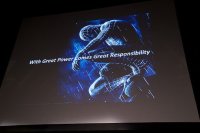Gaming for Social Good
Your content has been saved!
Go to My Saved Content.Over the years, many video games with social themes have been developed. In 2005, the United Nations World Food Programme released . Food Force was a downloadable game, developed by game publisher Konami, in which players delivered food to people in need. Another game for social change was MTV's Darfur Is Dying. Released in 2006, this online game put players in the role of a refugee in civil war-torn Darfur.
In my social studies classroom, I have implemented games with social themes, including , a role-playing game set in Haiti, and the poverty simulation games and . But can playing video games really change the world for the better?
The Social Good
The social media news site defines social good as the Social good includes campaigns that raise awareness and money through social media. One example is , which from its online followers to finance projects like . Each year, Mashable, along with organizations ranging from the United Nations to the Bill & Melinda Gates Foundation, sponsor the . The summit's goal is to "leverage the power of technology and new media to make the world a better place."
Video games that focus on social change have become a fast-growing sector of the "edutainment" gaming sector. An excellent example of a social good project directly linked to gaming is the . This project is based on a that detailed women's oppression in developing countries. Relating to the Half the Sky Movement, the United States Agency for International Development (USAID) released : the family-planning awareness titles Nine Minutes and Family Choices, and the digestive health game Worm Attacks. In the U.S., the Facebook game was published to raise Americans' awareness of international women's rights. There is a on Half the Sky's positive social affects.
Games for Change
Nowhere is gaming for social good more evident than with the organization (G4C). Their mission is simple: "Catalyzing social impact through digital games." Game categories include education, poverty, human rights, health, the environment and economics.
Since 2004, G4C has sponsored a festival in New York City. The purpose of the festival is bringing together game designers and educators to create engaging games that have a social impact. Previous keynote speakers have included Supreme Court Justice and founder Sandra Day O'Connor, former Vice President Al Gore, author and ISTE 2013 keynote speaker Jane McGonigal (who is also a G4C board member), and (Half Life 2, Portals) founder and CEO Gabe Newell. At the 2012 G4C Festival, Valve announced to bring their physics puzzler into the classroom. This past June 17-19 marked the at New World Stages in New York. Over 100,000 game designers, professionals and academics attended.
, from the , won this year's "Game of the Year" award. Quandary is a free, online game that engages players in the ethical decision-making process of colonizing a new planet. Users can track their progress globally on the site's leaderboard. Teachers can access the , which features lesson plans and .
Including "Game of the Year," there were four major G4C Festival award categories. , which won "Most Innovative" game, is a mobile thriller that Meanwhile, , a life science game that puts the player in the role of a growing plant, won "Best Gameplay." In the final major category, was recognized as the game with the "Most Significant Impact." Data Dealer is a web-based game that raises awareness about online privacy concerns.
G4C also promotes social gaming. Playable as a Facebook app and similar to Farmville, uses game currency called "joy," which can be exchanged to fund real-world children's charities. A new version of was also revived as a Facebook game.
Collaboration Superpowers
In the bestselling book , author Jane McGonigal states that games can "give us collaboration superpowers." It is becoming increasingly apparent that playing games together -- with a positive purpose -- can effect change for the better.
To review all of the G4C featured games, browse .
